
Congress Still Has a Say on Low US Refugee Cap
Congress Still Has a Say on Low US Refugee Cap

The Trump administration announced this week that it intends to limit the number of refugee arrivals in the coming year to a record-low figure, but refugee advocates and lawmakers say Congress still has time to change the president's mind.
At a press briefing on Monday, Secretary of State Mike Pompeo said the executive branch was proposing a ceiling of "up to 30,000 refugees" in the fiscal year that begins Oct. 1, which, if finalized, would be the lowest cap on refugee admissions since the start of the program in the early 1980s.
But before that decision can be made official by the president, by law Congress has to be consulted. And with 12 days to go before the end of the fiscal year on Sept. 30, that hasn't happened yet.
Democratic Sen. Ed Markey of Massachusetts criticized the administration after Pompeo's statement:
"The Trump administration is proposing to slash refugee admissions before the legally mandated consultation with Congress. At every turn, we must resist this administration's efforts to isolate America and abandon the persecuted," he tweeted.
"This is simply a proposal that was put forward to Congress," a State Department spokesperson wrote to VOA, characterizing the cap as "an inter-agency number."
But the State Department bureau that handles refugee issues did not immediately return a request from VOA on Tuesday for information on when the consultation with Congress would take place.
Congress has acted before
Trump has implemented massive cuts to the U.S. refugee program, which was for decades the top recipient of refugees who could not stay in their countries of asylum and could not return to their home countries.
Under his administration, the number of arriving refugees plummeted. Staff from resettlement agencies lost their jobs in the U.S. and abroad. And in a move consistent with Trump's campaign promise to block Muslim immigration to the U.S., the number of Christian refugees is outpacing Muslims.
It's customary for administration officials to suggest a number before the official determination is made, said Jen Smyers, director of policy and advocacy at Church World Service, one of the leading refugee resettlement agencies in the United States. In that sense, Pompeo's Monday announcement does not fall outside the norm.
"The timeline is tight," she said Tuesday during a call with reporters and resettlement stakeholders, adding that Congress has succeeded before in raising the president's intended refugee ceiling.
"We would hope that the [congressional] consultation would be scheduled as soon as possible, and that we'll see the process unravel — which really makes now a critical time for members of Congress and the public and the media to put pressure not only on the administration but also on Congress to hold the administration accountable to setting a more realistic and a more historically relevant number."

During Trump's first year in office, the administration set the ceiling at 45,000 refugees, but has yet to reach the halfway mark with less than two weeks remaining in the fiscal year.
Pompeo reiterated a rationale frequently employed by the administration: Refugees pose a security threat to the United States. There are no data that support that claim, however.
"I think there's a misunderstanding of who the refugees are and what they are really looking for," Wilson Kubwayo, a resettled refugee, said on the call with journalists and advocates on Tuesday. "Nobody wants to be a refugee. It's because of circumstances that we find ourselves here."
U.S. perception abroad
Philemon Dushimire, a community organizer among his fellow Burundian immigrants and refugees in Maine, told VOA Swahili that the substantial reduction in refugee arrivals might affect how the United States is perceived abroad.
"The risk now [is that] America will be seen as a country which doesn't care about human rights violations in some places of the world, which doesn't care about the safety of people in danger," he said.
His point is not lost on politicians from both parties who were rankled by Pompeo's announcement on Monday. As a result, there may be some hope on Capitol Hill for those advocating for a higher refugee ceiling.
Rep. Ileana Ros-Lehtinen, a Cuba-born Republican lawmaker from the Miami area, was quick to respond on social media:
VOA's Swahili service and Patrick Nduwimana contributed to this report.
 Republican Hold on Senate May Be Slipping as Democrats’ SurgeNext PostIn Iowa, McAuliffe Says He’s Not Ruling Out 2020 Campaign
Republican Hold on Senate May Be Slipping as Democrats’ SurgeNext PostIn Iowa, McAuliffe Says He’s Not Ruling Out 2020 Campaign






